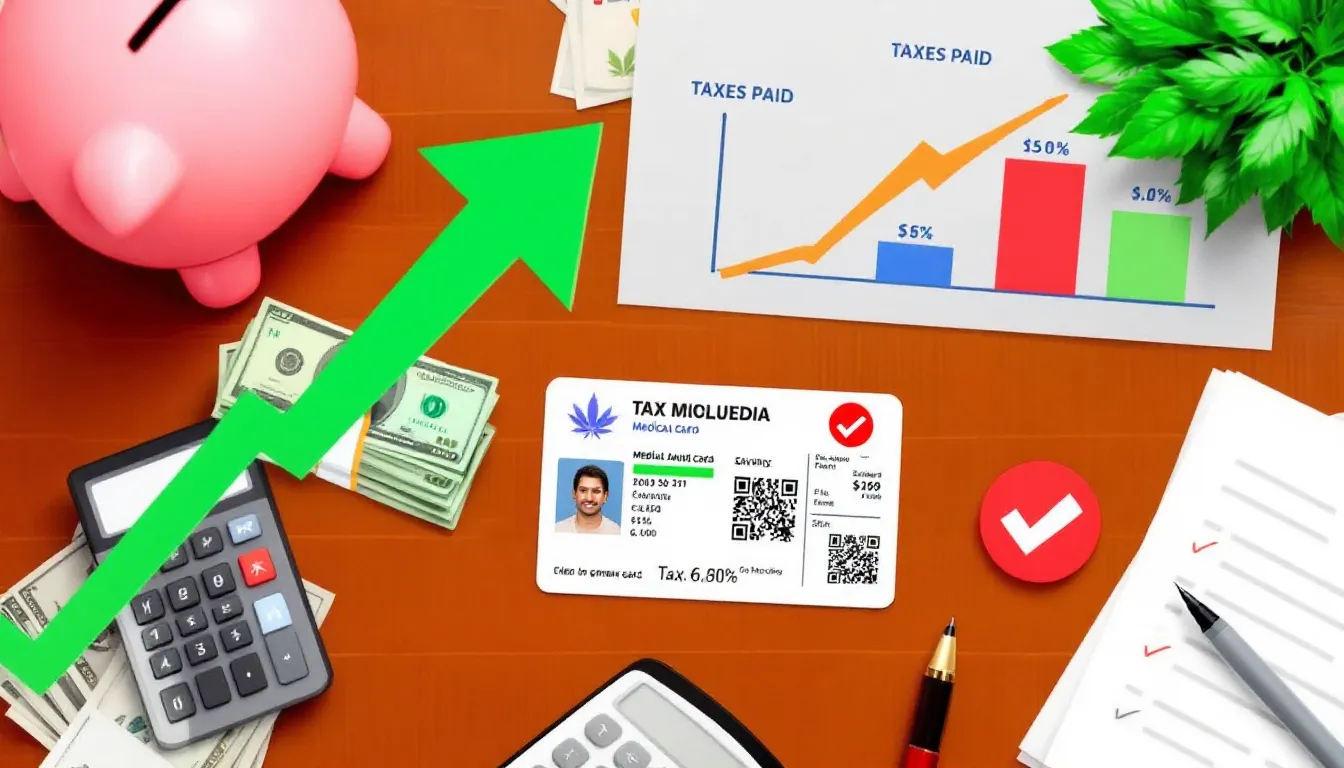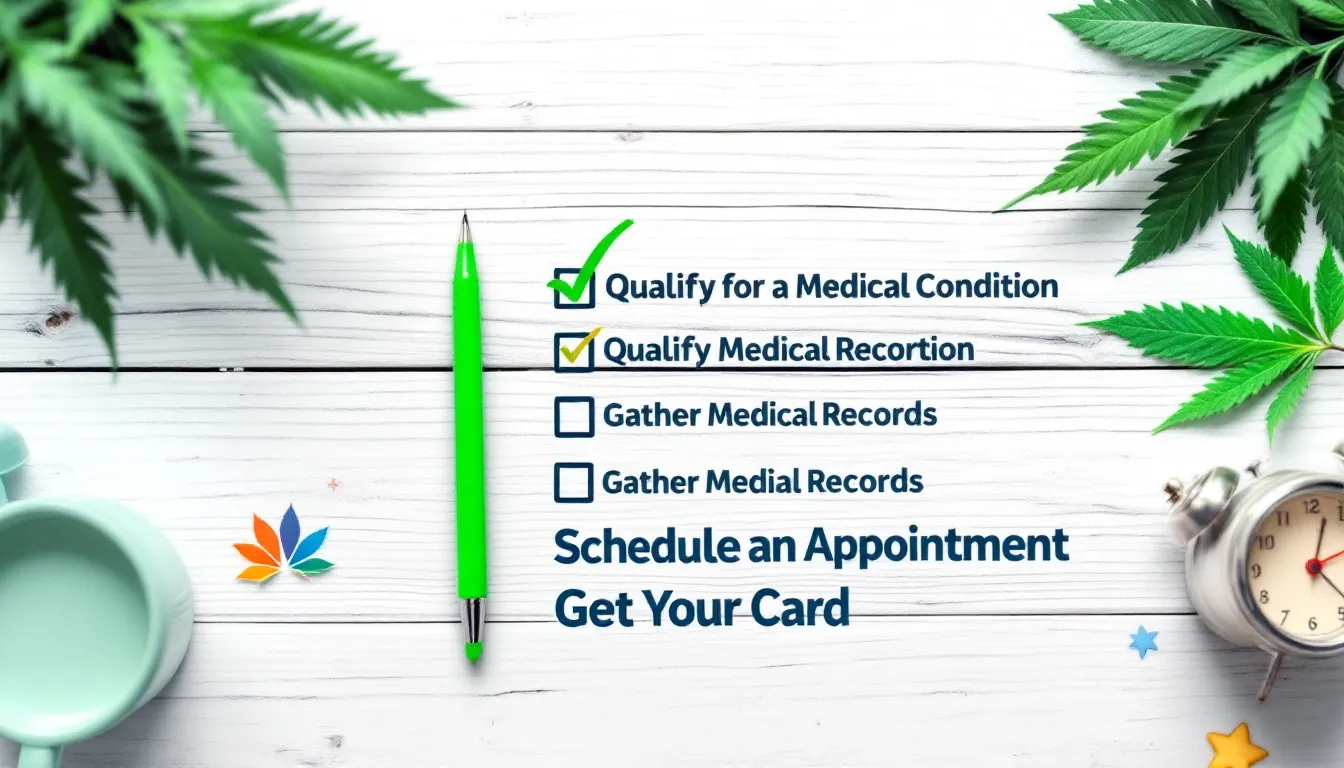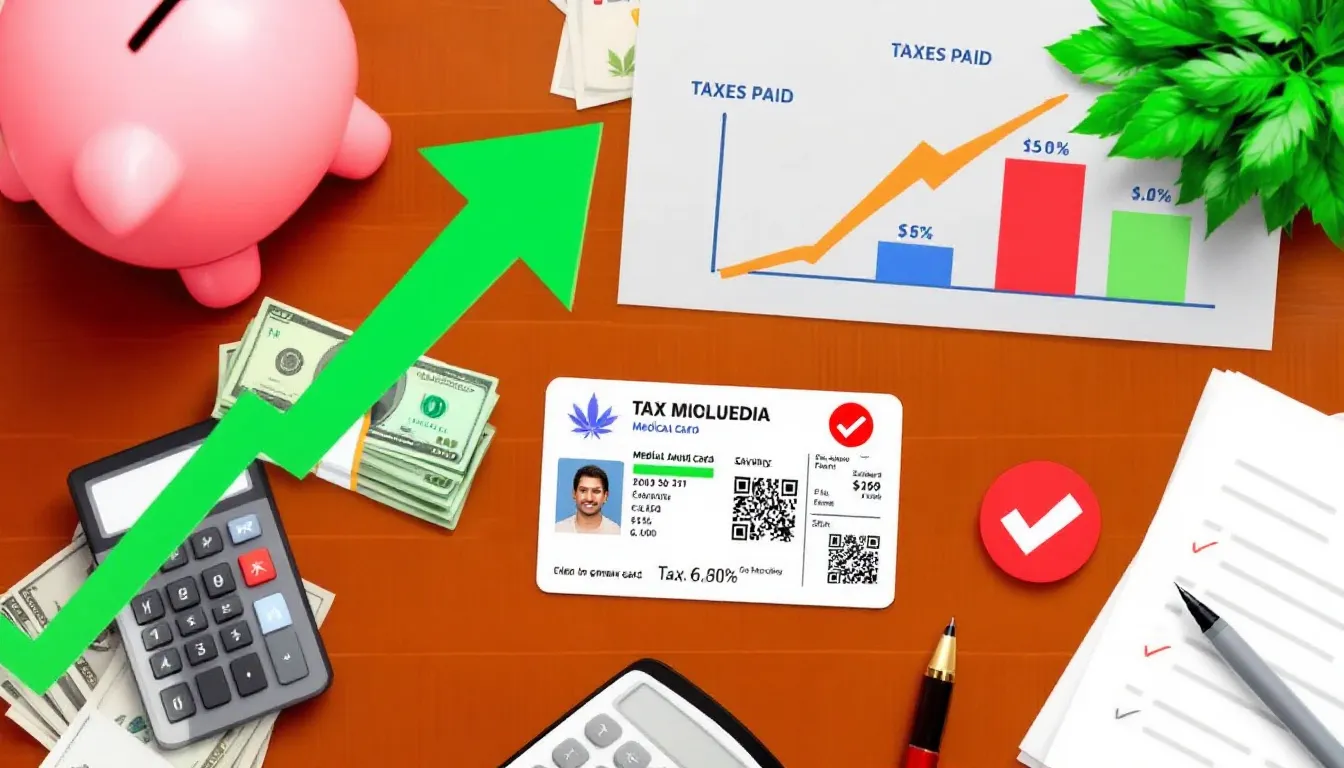Wondering how to save money on taxes with a medcard? Having a medical marijuana card can lower your cannabis-related expenses, particularly when it comes to saving money on taxes with a medcard. This article will show you how to benefit from reduced sales taxes, avoid excise taxes, and enjoy state-specific tax exemptions. Let’s dive into the Tips for Saving Money on Taxes and financial advantages of a medcard.
Key Takeaways
- Medical marijuana cardholders benefit from lower sales and excise taxes, significantly reducing the cost of cannabis products compared to recreational users.
- In addition to tax savings, a medical marijuana card can lower overall healthcare costs by reducing prescription drug expenses and the need for frequent medical appointments.
- Cardholders receive enhanced legal protections, including job security and higher possession limits, which contribute to financial stability and peace of mind.
Tax Benefits of a Medical Marijuana Card

One of the most compelling reasons to get your medical marijuana card is the array of tax benefits it offers. Medical marijuana cardholders enjoy significant financial savings through reduced tax rates and lower prices on cannabis products. Unlike recreational users, medical marijuana patients typically pay lower sales taxes and can sometimes avoid additional excise taxes. These tax benefits can substantially reduce the overall cost of cannabis products, making treatment more affordable for those in need.
For many patients, these tax savings can be transformative, accumulating over time and significantly impacting your budget.
Here are the specific categories of tax benefits and their potential impact on your wallet.
Lower Sales Taxes on Cannabis Products
Tips for Saving Money on Taxes
Sales taxes significantly affect the overall cost of cannabis products. Typically, medical marijuana cardholders pay lower sales taxes than recreational users. For instance, state retail marijuana sales tax is usually about 15%, but in states like Washington, it can reach 37.5% for recreational cannabis. This stark tax rate difference provides considerable savings for medical cannabis patients.
Lower sales taxes allow patients to allocate more funds toward their health and well-being. Over time, this translates into substantial savings, making medical cannabis a more viable and affordable treatment option.
Avoiding Recreational Excise Taxes
Another significant advantage of holding a medical marijuana card is the ability to avoid hefty excise taxes that are often levied on recreational cannabis. These excise taxes can reach up to 30% in some states, making recreational cannabis a costly option. For example, Alabama imposes a 16% excise tax on adult-use cannabis. In contrast, medical marijuana patients are exempt from these excise taxes, which can result in significant savings.
Medical cannabis is often exempt from retail and local general sales taxes, providing further financial relief. In states like New Jersey and Vermont, cardholders enjoy a 0% sales tax rate on their purchases, making cannabis products more affordable for patients.
State-Specific Tax Exemptions for Medical Cannabis
State-specific tax exemptions amplify the financial benefits of a medical marijuana card. In states like California and Illinois, cardholders can save 20% or more. These exemptions or reductions significantly lower the overall cost of treatment.
State-specific exemptions make medical cannabis more affordable by reducing or eliminating taxes, ensuring patients can access treatment without financial strain.
Financial Advantages Beyond Taxes

A medical marijuana card offers numerous advantages. These benefits go well beyond just savings on taxes. Holding a medical card can provide access to cheaper alternative treatments, reducing overall health expenses. For example, medical marijuana legalization has been associated with lower health insurance premiums, potentially saving patients up to $1,663 annually.
These financial advantages can make a significant impact on your overall healthcare costs. By reducing prescription drug costs and lowering healthcare expenses, a medical marijuana card can help you save money while improving your quality of life.
Reduced Prescription Drug Costs
Medical cannabis offers a more affordable alternative to traditional medications, potentially reducing overall prescription costs. Patients often report significant savings on medications, as medical cannabis serves as a less costly option.
Patients using medical cannabis may reduce their reliance on more addictive prescription medications, leading to cost savings and better health outcomes. Its therapeutic benefits make it a valuable option for those looking to cut down on prescription drug costs.
Lower Healthcare Expenses
Medical marijuana use may result in fewer medical appointments, leading to overall healthcare savings. Its availability can reduce the need for hospital visits, contributing to lower medical costs.
Patients may require fewer medical appointments, resulting in overall healthcare cost reductions. Over time, these savings make medical marijuana a cost-effective option for managing chronic conditions.
Enhanced Legal Protection and Its Financial Impact
Medical marijuana cardholders enjoy specific legal protections regarding the purchase, possession, and use of cannabis. A medical marijuana card grants patients legal immunity from prosecution when using cannabis lawfully, minimizing the risk of fines and legal fees.
Avoiding costly legal issues related to cannabis possession allows patients to achieve greater financial stability, highlighting a crucial financial benefit of holding a medical marijuana card.
Employment Rights and Job Security
In some states, medical marijuana patients have legal protections that prevent them from being dismissed from their jobs solely for their medical cannabis use. These protections help reduce the risk of job loss for medical marijuana patients, contributing to their financial stability.
Medical marijuana users often have greater employment protections compared to recreational marijuana users in states where both are legal, leading to less financial instability and job security.
Legal Defense and Possession Limits
Cardholders generally face higher possession limits, allowing them to hold larger quantities of cannabis for medicinal purposes and reducing the risk of legal troubles. Possession limits vary by state, significantly affecting how much cannabis a patient can legally carry.
Higher purchase limits for medical marijuana cardholders compared to recreational users help avoid potential legal issues, essential for maintaining financial stability and peace of mind.
Access to High-Quality Cannabis Products

Medical cannabis is typically more potent than recreational products, offering benefits for various medical conditions. Cardholders can access a broader selection of cannabis products and cannabis product tailored to their medical needs, ensuring high-quality, lab-tested options for effective treatments.
Cardholders often experience faster service at dispensaries, enhancing their purchasing experience. The combination of potency, selection, and service makes medical cannabis a superior option.
Cost Savings from Potent Products
Medical marijuana’s higher effectiveness often results in significant cost savings, as patients can achieve therapeutic benefits with less product.
Potent medical cannabis allows patients to manage their symptoms more effectively and economically, proving to be a valuable and cost-effective treatment option.
Quality Control and Safety
Licensed dispensaries must meet strict regulatory standards, ensuring medical cannabis products undergo thorough safety and quality testing. A Certificate of Analysis (COA) is available upon request, detailing cannabinoid content and safety measures.
A medical marijuana card ensures that products are closely monitored for purity, efficacy, and safety, enhancing consumer protection and confidence.
How to Maximize Your Savings with a MedCard

Maximizing savings with a medical marijuana card is crucial for managing healthcare costs effectively. Shopping at various dispensaries and regularly comparing prices can lead to significant cost savings.
Utilizing discounts and loyalty programs further enhances savings. These programs help patients maximize their savings and make the most of their medical cannabis card.
Comparing Dispensary Prices
Prices for the same cannabis products can vary by dispensary, making price comparison essential. Checking multiple dispensaries for the best deals is beneficial.
Many dispensaries offer varied pricing structures based on product types and promotions, so comparing before buying is essential. Shopping around helps patients find the best deals.
Utilizing Discounts and Loyalty Programs
Loyalty programs reward repeat customers with points, discounts, or free products, enhancing overall savings. These programs often provide substantial savings on future purchases.
Patients should actively seek dispensaries offering loyalty programs and additional discounts to maximize their savings.
Budgeting for Medical Cannabis
Creating a budget for medical cannabis expenses helps patients manage spending effectively, prioritize necessary products, and avoid overspending.
A detailed budget for medical cannabis expenses ensures effective spending management, helping achieve long-term cost savings and financial stability.
Getting Your Medical Marijuana Card

Obtaining a medical marijuana card typically starts with an appointment with a medical marijuana doctor. Patients must then register with the relevant state authority and pay a variable fee.
Understanding the qualifying conditions and application process ensures a smooth experience. Following the correct steps helps avoid potential issues and obtain the card efficiently.
Qualifying Conditions and Doctor Approval
Medical cannabis can be obtained for conditions like severe pain, chronic nausea, or PTSD. The practitioner determines if medical cannabis could benefit the patient’s health and if they qualify.
Patients typically visit their qualifying doctor every 210 days to maintain their recommendation. Telemedicine simplifies the approval process by allowing patients to connect with a licensed telehealth doctor.
Application Process and Fees
The application process begins with an appointment with a qualified doctor who can recommend cannabis. The doctor assesses whether medical cannabis is appropriate for the patient’s condition. After approval, patients follow their state’s specific steps to complete the application.
Patients must register with the relevant state authority and pay a variable fee. Correctly submitting all documentation helps avoid potential issues during the application process.
Diligently following these steps allows patients to obtain their medical marijuana card smoothly and enjoy its numerous benefits through the medical marijuana program.
Summary
Obtaining a medical marijuana card offers numerous financial and health benefits that can significantly improve the quality of life for patients. From substantial tax savings on cannabis products and avoiding high excise taxes to accessing high-quality, potent medical cannabis, the advantages are clear. In addition to these tax benefits, medical marijuana cardholders can also enjoy reduced prescription drug costs, lower healthcare expenses, and enhanced legal protections that contribute to financial stability.
By understanding the steps to obtain a medical marijuana card and utilizing practical tips like comparing dispensary prices, taking advantage of discounts, and budgeting effectively, patients can maximize their savings and make the most of their medical cannabis treatment. The journey to obtaining a medical marijuana card may require some effort, but the financial and health benefits make it well worth it. Embrace the therapeutic potential of medical cannabis and take control of your health and financial well-being today.
FAQs
What are the main tax benefits of having a medical marijuana card?
Having a medical marijuana card provides significant tax benefits, such as lower sales taxes and exemption from recreational excise taxes, which can substantially reduce the overall cost of cannabis products. The medical card application process is the first step to accessing these savings, allowing you to enjoy these financial advantages once approved.
How does medical cannabis reduce prescription drug costs?
What legal protections do medical marijuana cardholders have?
How can I maximize my savings with a medical marijuana card?
To maximize your savings with a medical marijuana card, compare prices among dispensaries, take advantage of discounts and loyalty programs, and maintain a budget for your cannabis expenses. This approach will ensure you get the best value for your spending. Additionally, using medical marijuana to improve sleep can also help reduce the need for other costly treatments or medications, further contributing to your overall savings.
What is the process to obtain a medical marijuana card?
To obtain a medical marijuana card, begin by scheduling an appointment with a qualified doctor who can recommend cannabis. Then, register with the state authority and pay the required fee. Following these steps will facilitate a smooth application process.





